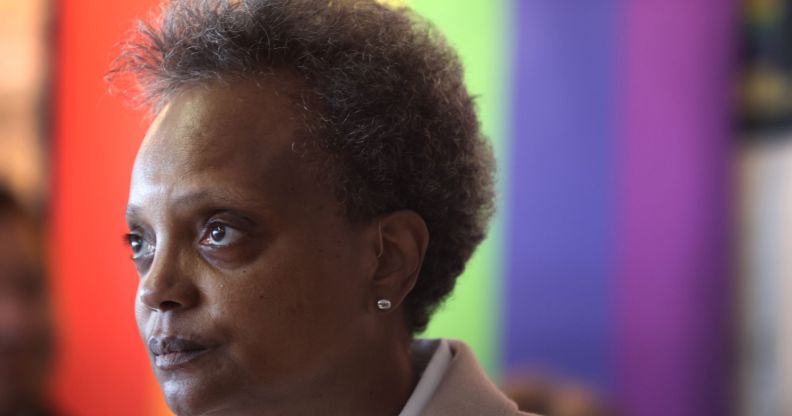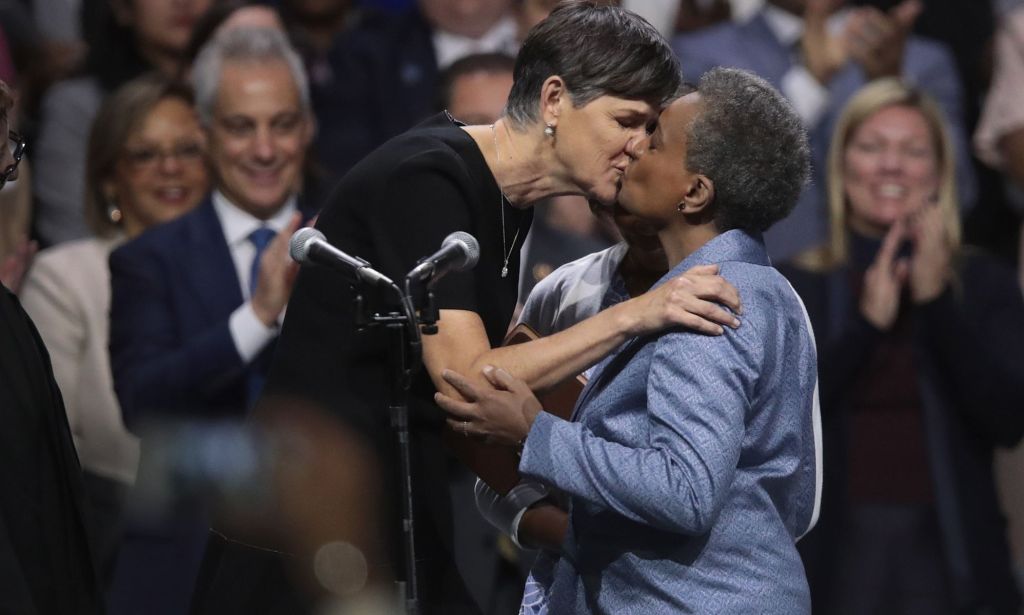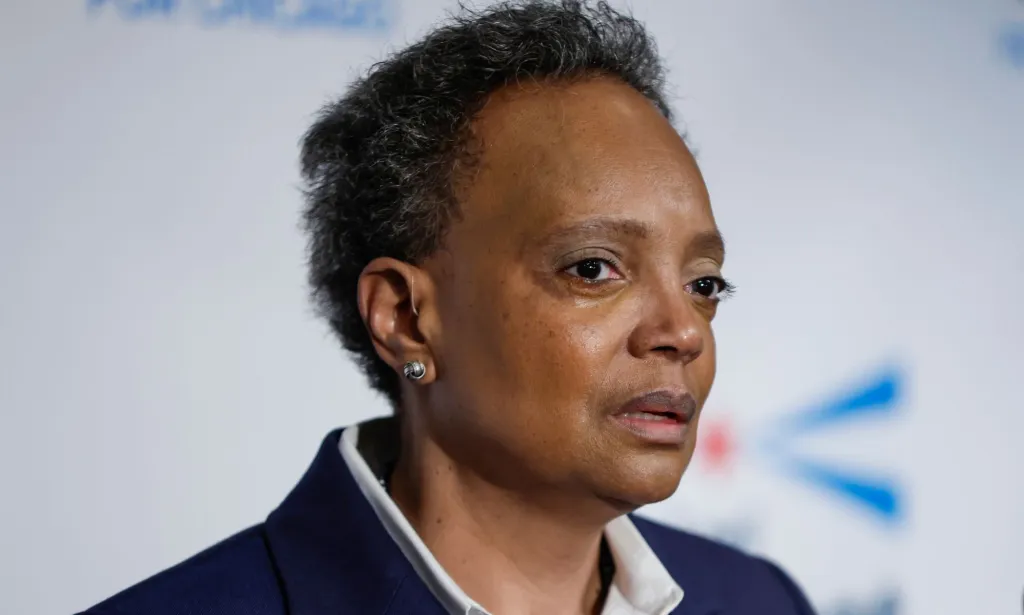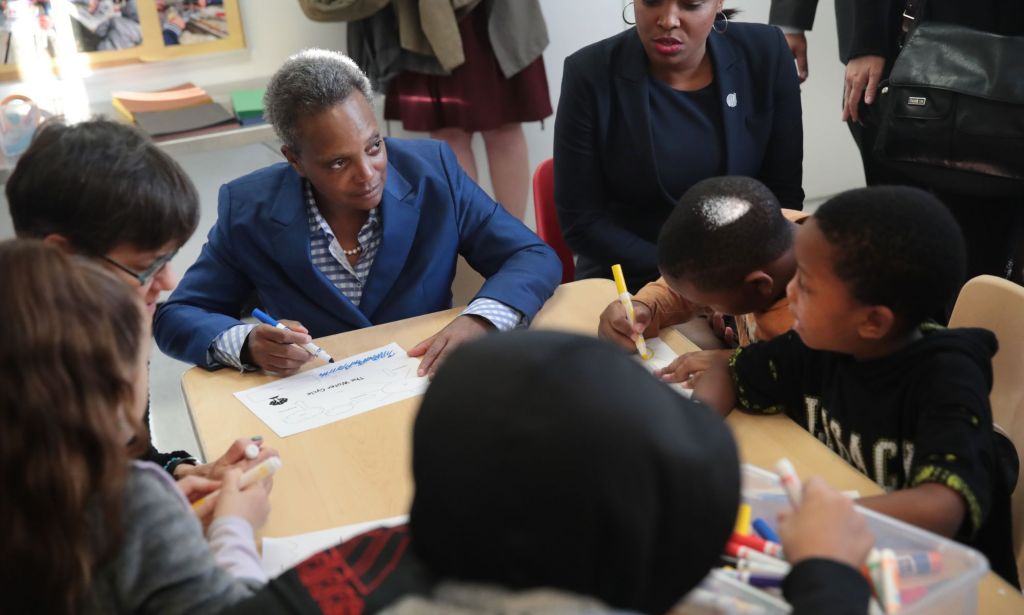Lori Lightfoot: Chicago’s first gay, Black mayor leaves complicated legacy after losing re-election

Chicago mayor Lori Lightfoot leaves behind a complicated legacy after losing her 2023 election bid. (Getty)
Lori Lightfoot made history when she became the first Black, openly gay female mayor of Chicago, but her single term may be remembered as one of the most fraught in the city’s recent history.
The Democrat lost her bid for a second term as the mayor of the third largest city in the US on Tuesday (28 February). She conceded defeat to two challengers, both Democrats, who will face off in an April run-off to be the next mayor of Chicago.
In a concession speech, Lightfoot told her supporters that it’s been the “honour of a lifetime” to be mayor. She said she’d “stand here with [her] head held high and a heart full of gratitude” despite the defeat.
Lambda Legal senior attorney Kara Ingelhart told PinkNews that Lightfoot, as Chicago’s first Black woman and first openly lesbian mayor, “advanced LGBTQ+ issues in her administration’s priorities”.
“She re-launched the Mayor’s LGBTQ+ Advisory Council, introduced a resolution to drive more city contracts to LGBTQ+ owned businesses and created one of the first housing programs for Black and Latinx gay and bisexual men who are HIV-negative and use PrEP,” Ingelhart said.
“Many LGBTQ+ serving organizations, particularly those serving residents with and at risk of HIV, saw an increase in city funding, and her administration supported the Hire Trans Now initiative in partnership with the Chicago Therapy Collective to drive $75,000 toward the effort to increase trans employment in the mayor’s office and get 250 businesses throughout the city (five in each ward) to commit to hiring trans workers.”
Colleen K Connell, executive director of the ACLU of Illinois, said Lightfoot’s tenure in office will be “remembered for opening doors and possibilities for the LGBTQ+ community in Chicago and beyond”.
“The community was able to see itself reflected in the office of mayor and feel imbued with political power,” Connell said.
“LGBTQ youth across the nation who are under attack in many states could find inspiration in seeing themselves in someone serving in public office. That reality should benefit Chicago and the country for years to come.”

Lightfoot is the first incumbent Chicago mayor in 40 years to lose re-election. She will play out her term, which ends in May.
A former prosecutor, Lori Lightfoot won her first election for mayor in 2019 by a wide margin despite having no experience of running for office. She capitalised on corruption scandals besetting Chicago politics and positioned herself as an outsider who could be a breath of fresh air for voters.
Lightfoot faced homophobia during her first election race as anti-LGBTQ+ fliers were circulated around some neighbourhoods. She proudly declared “hate has no place in Chicago” and urged the city to come together to fight those who wished to “propagate hate”.
In 2020, she confronted several Chicago city council members who wondered if a proposal to set aside a portion of city contracts for LGBTQ-owned businesses would result in additional political scandal.
She told the council that, as a “Black, gay woman, proud on all fronts”, she was “disturbed” by the “nature of the discussion”.
Chicago’s police department clashed with demonstrators during the Black Lives Matter protests that arose after the murder of George Floyd in 2020, and a threat by then-president Donald Trump to shoot those protesting his killing.

Lori Lightfoot refused to pull her punches, saying Trump’s comment was “profoundly dangerous”. She slammed the Republican for flaming “racist urges” and trying to “destabilise local government”.
“And I will code what I want to say [to Trump] and it starts with F and ends with U,” she added.
Ingelhart pointed out Lightfoot was also a champion of “reproductive freedoms, freedoms that serve as the legal basis for many LGBTQ+ legal protections”.
“In the wake of the US Supreme Court’s disastrous Dobbs decision, she prohibited city agencies from aiding out-of-state criminal proceedings against people seeking abortion care in Chicago and has directed $500,000 to front-line abortion care agencies such as the Chicago Abortion Fund and Planned Parenthood,” Ingelhart said.
Lightfoot didn’t mince words when Supreme Court justice Clarence Thomas suggested that same-sex marriage should be reviewed in light of Roe v Wade overturning in 2022.
A fired-up Lightfoot joined in with a member of the crowd at a local Pride event to shout “F**k Clarence Thomas” as queer people and allies cheered in support.
The Chicago mayor emotionally pleaded for the end of violence against the LGBTQ+ community in the wake of the mass shooting at Club Q in Colorado Springs on 9 November, 2022. The attack killed five people, injured 22 others and left the queer community reeling from the horrific violence.
“I’m sick of this s**t. How many people need to be murdered? How many lives torn apart? Until it actually stops?” Lightfoot tweeted. “We don’t have to live like this. And we don’t have to die like this.”
Lori Lightfoot faced increasing levels of violent crime in Chicago and repeatedly clashed with teachers
As Chicago mayor, Lightfoot led a city beset by chronic gun violence and faced criticism for not doing enough to stem high crime rates. Shootings, homicides, carjackings and theft have dramatically spiked during her administration.
Chicago ended 2022 with 695 homicides, a decrease from 804 in 2021 but still alarmingly high. The city also saw more than 20,194 incidents of theft in 2022, up from 12,978 incidents in 2021, according to the Chicago Police Department’s end-of-year report.
In the years since taking office, Lightfoot struggled with low approval ratings as she navigated the city through the COVID-19 pandemic and the subsequent economic fallout. She even, at one point during the social distancing restrictions, drove around Chicago to tell people gathered outside to social distance or head home.
She has been part of a long-running feud with the city’s powerful teachers’ union over compensation, class sizes and other issues plaguing Chicago’s public education system.

Just a few months into her mayorship in 2019, the war came to a head when the union declared an 11-day strike, the longest in decades.
The rift between Lori Lightfoot and the union continued to grow over the years, and the teachers union backed one of Lightfoot’s opponents – Brandon Johnson, a Cook County commissioner and organiser for the Chicago Teachers Union – for mayor.
Johnson now faces off against former Chicago Public Schools CEO Paul Vallas in the April run-off.
How did this story make you feel?

